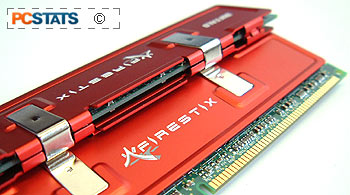It's great to see how individual memory stacks up
against one another under stock configuration, but we're also going to show how
they stack up to each other when overclocked. The results are listed below for
some of the recent memory to cross our test bench. The higher the speed, the
better.
The Buffalo Firestix FSX5000V DDR performs only mediocre
in the Athlon64 test system... but the Intel side of things it a totally
different story! It's nice to see that Buffalo can keep up with the of likes
Corsair, OCZ and GeIL!
Buffalo Technology Firestix
- Good for Intel!
Firestix is a catchy name for memory, but consider the
other enthusiast calibre memory on the market; Corsair's XMS/TwinX, OCZ has
their Platinum line, Kingston produces the HyperX, and even Crucial just got
into the game with their Ballistix memory.
 Like all other high speed RAM
on the market, the Buffalo Firestix FSX5000V RAM are built for Intel Pentium 4
systems. It does the job on other platforms as well, albeit not as well as low
latency memory.
Like all other high speed RAM
on the market, the Buffalo Firestix FSX5000V RAM are built for Intel Pentium 4
systems. It does the job on other platforms as well, albeit not as well as low
latency memory.
The performance of the Firestix memory was good when
compared to other high speed DIMM's, and the memory overclocked pretty well on
the Intel system too! In our own tests, we were easily able to hit the default
speed of 250 MHz with 3-4-4-8 timings, and 2.7V.
Raising the voltage to 2.8V allowed us to go as high as
261 MHz with the Buffalo Firestix, which is definitely very good!
Buffalo sell these sticks of 512MB PC4000 DDR for $149USD/each, so if you're
looking for some high speed memory for your Pentium 4 system (and want some nice
overclocking results), make sure you look out for a pair of Buffalo's red
Firestix DDR.
Find out about this and many other reviews by joining
the Weekly PCstats.com Newsletter today!
Related Articles
Here are
a few other articles that you might enjoy as well...
1. Corsair TwinX1024-3200XL Pro
Memory Review
2. Mushkin Enhanced PC3200 Special
Edition Memory Review
3. OCZ PC3500EB Platinum DDR Memory
Review
4. Corsair
TwinX1024-4400PT Platinum Memory Review
5. Memory Bandwidth vs. Latency Timings
